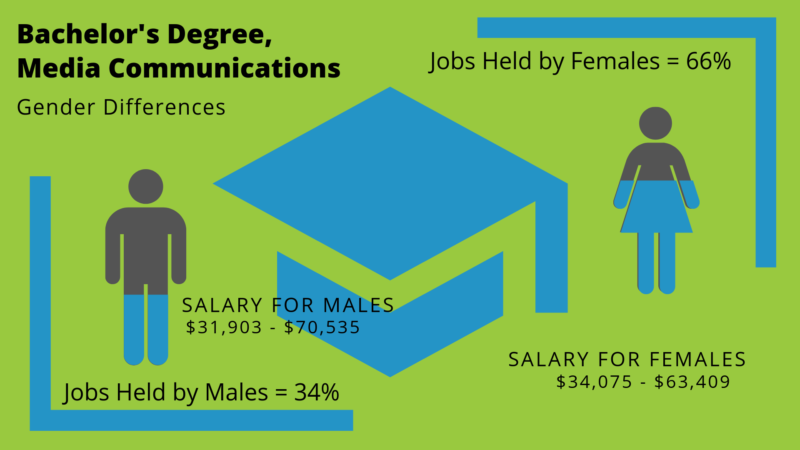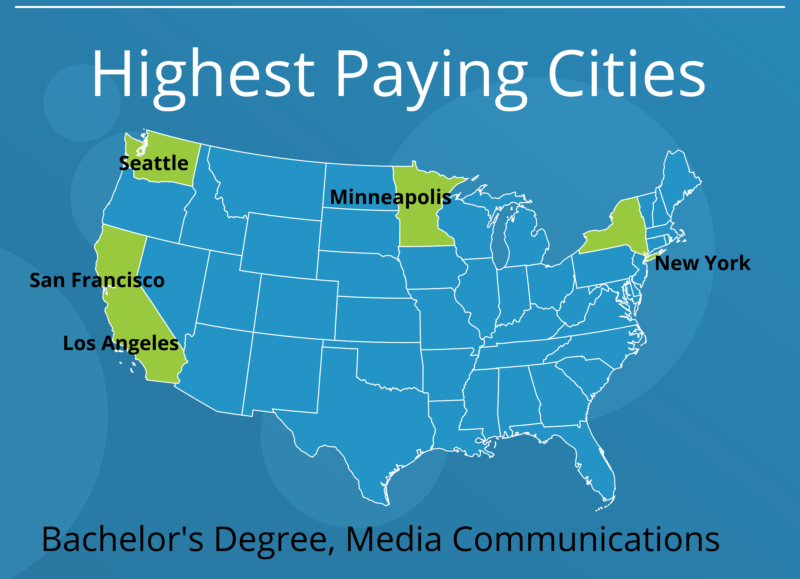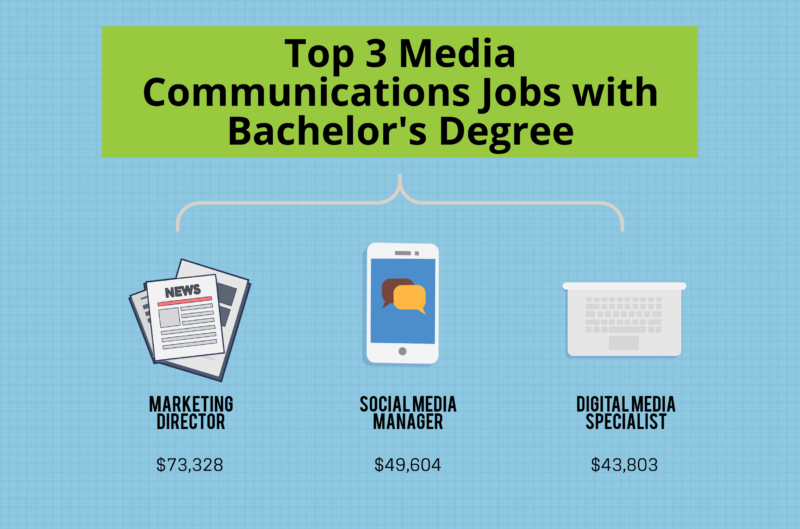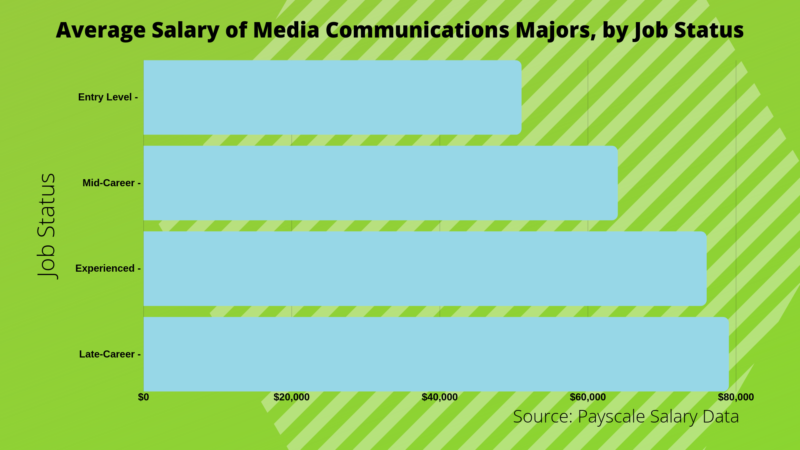Key Information:
- A Bachelor’s in Media Communications offers diverse career paths such as journalism, public relations, advertising, and digital media.
- Students develop skills in writing, editing, multimedia production, and strategic communication. The degree also prepares graduates for roles in social media management, content creation, and media planning.
- Many programs offer internships and hands-on projects to enhance practical experience and job readiness.
Media and communications represent a large and steadily growing sector, all the more because it overlaps with so many other occupations. Because of that growth, a degree in communications and media studies can come with any of several niches, specializations, and career paths.
What Is a Media Communications Degree?
Is media studies a good degree? Is a communications degree worth it? These are some of the first questions on many people’s minds when considering media and communications studies. As with any degree, the answer to is media studies a good degree will depend on the person’s goals.
Related:
- Best Bachelor’s in Media Communications Degree Programs
- Best Online Media Communications Degree Bachelor’s Programs
- Fastest Online Media Communications Degree Bachelor’s Programs
- Most Affordable Online Media Communications Degree Bachelor Programs
Applicants may find the media and communications field the right fit for their needs if they:
- Enjoy talking to people and figuring people out
- Like having the ability to communicate their messages clearly and efficiently
- Enjoy connecting with different people and groups of people
- Want to improve their ability and confidence when writing and communicating
- Already enjoy things like blogging or using social media
- Want to learn how to leverage natural communication skills to their benefit
Objectively speaking, yes, communications and media studies degrees are definitely good degrees, particularly because of their flexibility and adaptability. Subjectively, the answer will depend on the applicant’s desires, dreams, talents, and ability to choose a good media and communications studies degree program or school.

What Does a Media Communications Degree Offer?
When wondering is a communications degree worth it, consider that the field opens many career paths and opportunities for degree holders. Of course, this all begs another question: What can you do with a mass communications degree?
The media communications major also has a lot of overlap with other majors and fields. This means career paths can include things like public speaking and public relations. Still, the degree also opens avenues to things like journalism, marketing, and advertising.
Those examples are only a few of the careers available to communications degree holders. Each of these positions requires someone with an understanding of communication, getting a message across, and making sure the message is clear.
Students will also learn how to stay abreast of trends in mass communication that they can analyze, understand, and leverage. Media is one of the greatest influencers of modern times. Mastering the subject puts students in a position that makes them valuable to just about any industry.
A look at the media studies definition can help people understand how broad a reach a communications and media studies degree can really have. A broad media studies definition includes the study of how people achieve mass communicate through modern technology. Included in that study is a look the history, technical aspects, and analytical considerations for media studies.
A media and communications studies degree goes a little further as the communication and media studies definition includes aspects of communication in general. Communication powers every aspect of life. Communication also includes aspects of sociology and psychology, which are some things a media communications major will study as they navigate the subject.
Gaining an understanding of how to analyze and apply that penchant for communication to commercial, business, and public enterprises makes a communication degree an invaluable tool towards finding a rewarding career and place in the industry. Those interested in a media communications degree should wonder about what can you do with a mass communications degree to help them plan for how they will use their degree on graduation.
How Do You Choose an Excellent Media Communications Degree School or Program?
As with any school or program, finding the best universities for media studies comes down to a few basic things all applicants can start with. Potential students need to start with understanding the importance of accreditation.
Properly accredited schools and programs help to narrow the list as well as weed out schools and programs that are less than ideal for those seeking a superior media communications degree program experience. Several types of accreditation exist.
Accreditation means the school or program an applicant wants to attend receives regular assessments as to its educational quality and standards. Understanding the different types of accreditation can become a little confusing, but there are a few things applicants should understand about accreditation. A good media communications program can have multiple types of accreditation. Potential students should first check for regional accreditation.
Understanding Regional Accreditation for Media Communications Degree Programs
Regional accreditation organizations handle accrediting duties for a specific region of the country, hence the name. Regional accreditation status means the school, college, or university meets minimum educational standards. There are seven regional accrediting organizations, which collectively form the Council of Regional Accrediting Commissions.
Regional accreditation is the oldest, most trusted, and most recognized form of accreditation. Regional accreditation is also known as institutional accreditation because the accrediting standards apply to all parts of the institution, not just a specific program.
One major benefit of regional accreditation is that students have a far easier time of transferring credits between other regionally accredited schools. Since most colleges have regional accreditation, the ability to move around more freely with credits may appeal to many students.
Colleges with regional accreditation tend to have a stronger academic focus when it comes to degrees. This can mean students in a regionally accredited college may see more liberal arts coursework and more classes involving the academic study of media and communications, as opposed to strictly career-oriented courses. Because of that, regional accreditation doesn’t always show up for some schools that have a more technical or career-based focus.
However, none of these statements constitutes rules. A college can have regional accreditation but still provide career-oriented programs or also have other forms of accreditation to validate their media communications program.
Understanding National Accreditation for Media Communications Degree Programs
National accreditation agencies have a larger reach than regional accreditation agencies. Nevertheless, a national accreditation can mean several things, depending on the accrediting organization involved. National accreditation organizations favor vocational schools, technical programs, and career-oriented schools.
Accreditation from a national accreditation agency can cover an entire institution like regional accreditation, but they can also cover singular programs, classes, or academic paths separately. When the national accreditation organization covers a specific program or field, then the terms programmatic accreditation or specialized accreditation come into use.
Specialized accreditation can mean a lot more than other types of accreditation depending on the industry involved. Some national accrediting organizations hold complete sway over the educational standards of a particular industry. Even if a school doesn’t have regional accreditation, the specialized national accreditation status of a program can make a lot more sense for potential students.
The major benefit of national accreditation is the program will likely focus on coursework that’s more practical and natural and better tuned to the field the student will enter on graduation. Nevertheless, transferring credits from a nationally accredited school can often prove difficult.
Transferring credits between other nationally accredited programs often goes smoothly, but transferring them to a regionally accredited college isn’t always easy. These hurdles aren’t always present; it depends on the nationally accredited school someone initially earns credits from.
Some national accrediting organizations do create standards the regional accreditation organizations recognize as equal or superior to their own. In such cases, there’s a better chance of transferring credits, should a student need to.
In the case of media and communications, some of the best universities for media studies will have ACEJMC accreditation. The Accrediting Council on Education in Journalism and Mass Communications (ACEJMC) sets standards and evaluates mass communications programs. ACEJMC accreditation has wide recognition and represents an industry standard in many places.
Some of the best colleges for media communications majors will have ACEJMC accreditation, but potential students should know that ACEJMC accreditation status means that a school without it isn’t a good one.
A good rule of thumb for any school or program’s accreditation status is to do some research. First, check if the accrediting organization has the recognition of the US Dept. of Education. This federal agency gives recognition to regional, national, and other types of accreditation organizations.
Even if the accrediting organization doesn’t have that recognition, applicants can still do some research to see if the accreditation organization of the program they’re interested in has a good reputation or industry recognition.

What Are the Different Types of Media and Communication Degrees?
A bachelor’s in communication can come with various specialties. Because of that, media and communication courses have a focus on a particular concentration. For example, a BS in communications can have a focus on journalism.
The bachelor’s in communication isn’t the same as a journalism degree, but the two overlap. In fact, the two overlap so much that applicants may see media and communications degree programs that are actually a combination of the two, in the form of a communications and journalism degree.
Concentrations with media and communications degree can include:
- Business, commercial, and industrial relations
- Journalism, broadcasting, and media
- Marketing and advertising
- Politics and government
- Public relations
This means not every media communications degree is precisely the same type of degree. Beyond industry fields, some students may choose a more academic or scholarly pursuit of media and communications and enter the field of research or other career paths that deal more with the fundamentals underlying communication.
Some student may want a media communications degree with a strong focus on a specific industry rather than on any particular concentration. An example of this is a BS in Political Communications degree. For a student that knows they will apply their communications knowledge to something like video creation, courses in media and entertainment will make more sense.
Potential students should always pay close attention to the prospective media studies syllabus and make sure they understand exactly what any media communications degree courses are really offering. For example, some programs may have a strong focus on marketing and advertising when the student really wants to dig into media and communication courses designed more for politics and public speaking.
When it comes to the types of communication degrees available, a media studies syllabus should have all the information an applicant needs to understand if that particular program is right for their needs and goals.
How Are Online Media and Communications Degrees Different?
An online communications degree isn’t any different from a degree earned at any other school, college, or university. Students who graduate will receive their communications bachelor degree and go on to use their skills where they choose.
An online communications degree program works much like any other traditional degree program. All the same rules apply when it comes to choosing a program or finding the best online communications degree path. That includes looking for proper accreditation. Potential students will still have to make sure they’re choosing a school that provides the right types of communication degrees.
Nevertheless, choosing to become a media and communications major through a mass communication degree online does come with some potential benefits not often found in more traditional settings. While pursuing a bachelor’s in communications online, students can often take advantage of communications degree online programs that offer high levels of scheduling flexibility.
For many adults, scheduling their jobs and lives around their classes can become a real hassle. Many online mass communications degree programs allow for a slower pace, or alternatively, a faster pace through an accelerated communications degree online program. Many online programs are more affordable as well, but students should be careful — some less scrupulous online educators pack hidden costs into their programs.
An online bachelor’s in communications will come with the same coursework and dedicated study requirements. Applicants should not assume an online mass communications degree will require less of their attention than a traditional classroom. A mass communication degree online will certainly bring just as much challenge and give just as many rewards to those who graduate with their degree. The best online communications degree will come from a program with high standards and a great academic reputation.
Additionally, people interested in media and communications or courses in media and entertainment can find a tremendous amount of resources online. For example, many programs exist offering communication certification online, free online mass communication courses, and free online media courses with certificate proof of attendance. These things can supplement an online communications degree or help students self-guide themselves towards particular industries or roles that may look favorably on a communication certification online completion.
Do Media Communications Graduates Need Certifications or Licenses?
Communications certifications aren’t always necessary, but some industries or jobs may require or look favorably on some specific certifications. Communications certifications vary widely, so there are no specific certifications for communication professionals that all graduates need to chase.
Sometimes, a specific certificate can help a student find an entry-level position before they obtain their degree. This can help increase their experience and gain practical knowledge before they graduate.
A student should pursue communications certifications that fit with their goals, industry, or niche. Certifications for people who want to work internationally exist right alongside certifications for people who plan to work with social media.
Some specific tools a graduate may use in their career may have certification programs. Just about every networking or IT field has a certification for using certain types of technology for things like distributing rich media.
A good idea is for students to explore any related certification programs offered by the school. Many schools have certification programs or even include certain types of certification as part of the overall curriculum. If in doubt, a student would do well to look up common certifications used in the industry they plan to go into.

What Types of Careers Are Available in Media and Communications
Media and communication jobs represent a broad spectrum of career opportunities. Many traditional and established job types exist, but the digital age created a whole bevy of other potential career possibilities. It’s not just press releases and public image anymore!
Communications and media studies jobs that never existed before are also showing up all the time as technology changes the media and communications landscape. For example, the concept of new media continues to grow and evolve, leading to new career opportunities and even entrepreneurial paths for those who seek careers in media and communications.
Some media and communications jobs can include media professionals like:
- Digital designer
- Digital media buyer, coordinator, or manager
- Event manager
- Marketing consultant or manager
- Multimedia specialist
- Public relations
- Social media specialist or manager
- Television, film, or video director or producer
- Writer or journalist
- Interpreters
- Camera operators
- Strategist
- Copywriter
- Communications manager
- Video editors
- Content manager
- Marketing specialist
- Technical writers
- Public relations specialists
- Marketing manager
- News Analysts
With a communications degree jobs are plentiful and not limited specifically to the traditional media and communications field (like radio or newspapers). There are specializations like market research, digital marketing, graphic design, and more.
Media communications jobs and careers in media and entertainment exist in practically every sector. An applicant can find careers in media studies in education, legal, government, and literally any other sector that requires some aspect of communication. You can work in nonprofit, healthcare, human resources and more. Communications degree jobs are growing, and careers in media studies continue to evolve.
The types of jobs in media available today encompass both old and new media, which means media communications jobs still value both new and traditional skill sets. For example, the types of jobs in media that rely on journalism still require someone to know the history and traditional methods of conveying news.
At the same time, advances in technology mean careers in media and communications that rely on journalism will need the journalist to know how to apply those traditional fundamentals to modern platforms.
Mass communication degree jobs offer challenge, fulfillment, and sometimes, real change to the world. Media and communications careers and careers in media and entertainment will require graduates to stay abreast of trends and changes.
Many communications and media studies jobs can require applicants to have some experience. Internships, certifications, and finding entry-level jobs for communication majors can help applicants gain that experience before attempting to apply for hotly contested positions.
Often, entry-level jobs for communication majors can grow into other mass communication degree jobs and positions relatively quickly. Since media and communications careers can vary widely, communications and media studies jobs can also offer graduates a lot of room to move around and test the waters along different career paths.
What are the Salary Expectations for Media and Communications Graduates?
Media communications salary will depend on location, position, experience, and many other factors. A communication studies salary can also rise very high over time. Because of the need for communications majors in one capacity or another across many sectors, it’s certainly possible to find high-paying jobs with a communications degree.
For mass communication jobs, the salary can also depend heavily on the degree holder’s specialty, according to the BLS. For example, average base communication studies salary for a communications specialist is around $56k, but the average base salary for a marketing communications specialist sits around $68k. The same thing occurs with other communication and media studies salary ranges. Media communications jobs salary can average $50k; however, high paying jobs with a communications degree can average far more than that.
Often, job seekers looking for a good mass communication jobs salary should make sure they search for opportunities wherever they can. Some jobs that pay well don’t always seem obvious from the start. For example, a media communications salary can rise if the job exists within a certain niche.
One job may offer a lower salary for a media communications specialist, but another business may offer a far higher mass communication degree salary for a digital media communications specialist. Applicants should not assume one type of media and communications job will dictate the salary range for other types of jobs. For example, a public relations manager and a social media manager can make wildly different amounts of money, despite using the same type of degree as a qualifier.
In addition, demand also matters. A company with a full marketing team may offer a lower salary for a social media manager. But, a company that needs a competent social media manager right now to guide them into the social media landscape may start with a far higher salary offer.
Typically, management positions have the best salary ranges for degree holders. Beyond other salary considerations, degree holders can also carve a niche for themselves.
The skills and knowledge acquired through a media and communications program lend themselves heavily toward more entrepreneurial work. Degree holders can easily start businesses of their own as freelancers, consultants, and other types of independent contractors or free agents.

Are There Any Professional Organizations for Media and Communications?
Many professional organizations exist for media and communications. Some very large professional organizations exist for just about every media and communications discipline. Students and graduates should definitely consider joining a professional communications association as soon as they can. Professional associations come with a tremendous amount of benefits.
One of the main benefits of a professional organization is the ability to network with others in the same field. Networking and utilizing a professional organization can provide contacts, job opportunities, referrals, support, resources, and many other benefits. Membership in a communications association can also look good on a resume.
Some well-known professional media and communications organizations include:
- American Communication Association
- Association for Women in Communications
- Association of Marketing and Communication Professionals
- International Association of Business Communicators
- International Communication Association
- Public Relations Society of America
Many, many more associations exist. Students may have an organization in their school, or a local one in their hometown.
